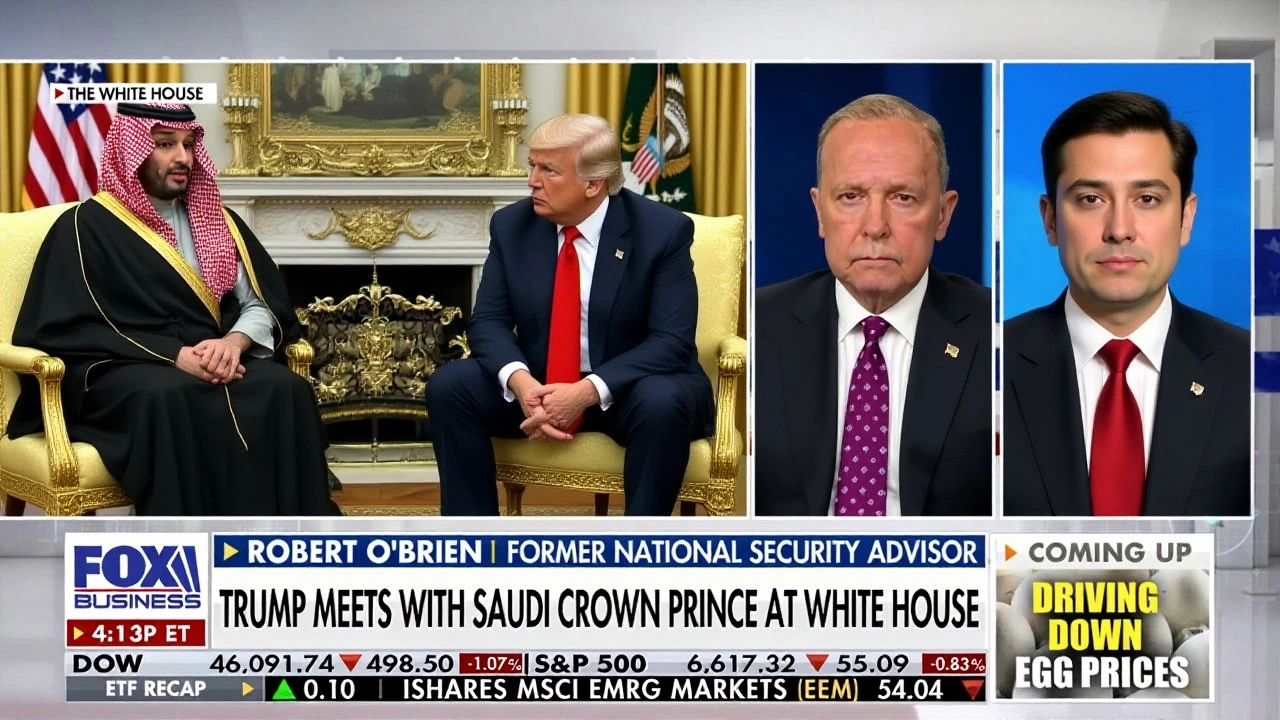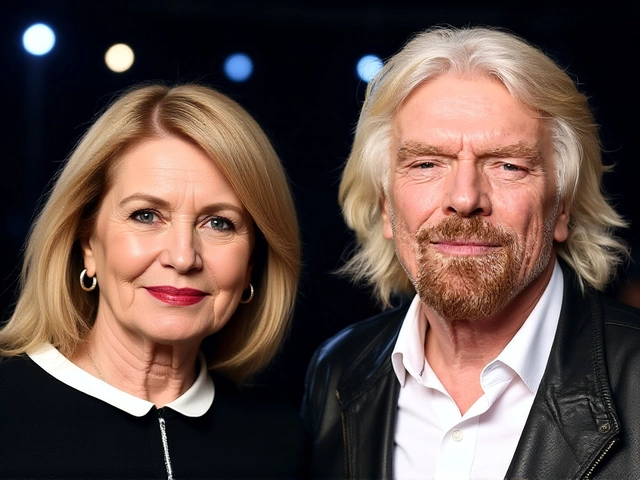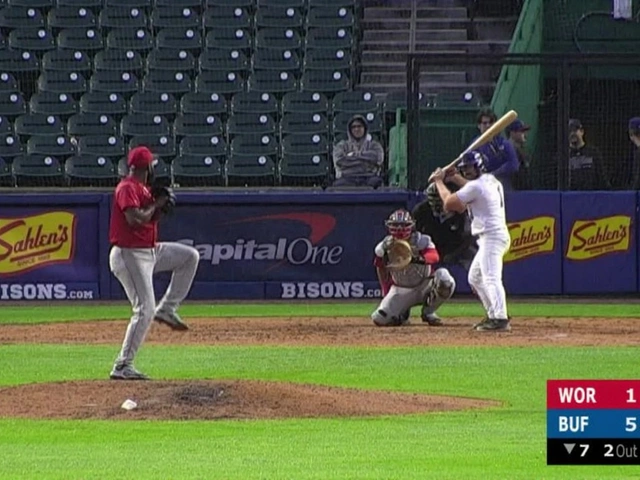When Saudi Crown Prince Mohammed bin Salman walked into the White House on November 18, 2025, he didn’t just arrive as a foreign leader — he arrived as a man trying to rewrite history. Behind him loomed the ghost of Jamal Khashoggi, the Washington Post journalist whose brutal murder in Istanbul seven years earlier still haunts his legacy. In front of him sat Donald Trump, the former U.S. president who once insisted MBS "knew nothing" about the killing — a claim that directly contradicts U.S. intelligence. The meeting, broadcast live across Fox News platforms, wasn’t just diplomacy. It was rehabilitation.
A Reputational Facelift in the Oval Office
Politico called it a "reputational facelift." And it’s hard to argue otherwise. For years, MBS has been painted as a modernizer who crushed dissent, jailed activists, and ordered assassinations. But the Middle East has changed. War in Gaza. Rising Iranian influence. A global energy scramble. Suddenly, Saudi Arabia — the world’s largest oil exporter, headquartered in Riyadh — is no longer just a pariah. It’s a necessary partner. Trump’s embrace, however awkward, signals a quiet recalibration in Washington. The U.S. doesn’t need to forgive the past to use the present."He wants to be part of the first world," said Robert Charles O'Brien, Trump’s former National Security Advisor, during a November 18, 2025, appearance on Fox Business Channel’s Kudlow. O’Brien, who served from 2019 to 2021, didn’t mince words. MBS isn’t just seeking investment deals or arms sales. He’s chasing legitimacy. A seat at the table. Recognition as a leader, not a liability.
The Khashoggi Shadow That Won’t Fade
Yet the past refuses to stay buried. The U.S. intelligence assessment on the killing of Jamal Khashoggi, declassified on February 11, 2021, left no room for doubt: MBS had "absolute control" of Saudi security and intelligence since 2017. The 15-man team that flew to Istanbul included operatives linked to Saud al-Qahtani, MBS’s former top aide who once boasted he "didn’t make decisions without the Crown Prince’s approval."On September 29, 2019, during a 60 Minutes interview, MBS denied ordering the murder. "Absolutely not," he said. But then came the pivot: "I take full responsibility as a leader in Saudi Arabia. This was a mistake." That line — "a mistake" — became the world’s shorthand for impunity. Now, in the Oval Office, he didn’t mention Khashoggi directly. "The murder has been painful for us," he told reporters afterward. "We’ve improved our system. We’re doing our best that this doesn’t happen again."
It’s a familiar script. Apology without accountability. Regret without reform. But here’s the twist: the world is listening less. Investors care about Saudi Vision 2030. Oil buyers care about supply chains. And in Washington, where political memory is short and strategic interests are long, the Khashoggi case is becoming a footnote — not a dealbreaker.
Why Trump’s Endorsement Matters More Than Ever
Trump’s stance on Khashoggi has always been a puzzle. In 2018, he called the killing "terrible" — then added, "We don’t want to lose the $110 billion deal." In 2025, he doubled down: "He knew nothing." That’s not just denial. It’s a political act. Trump knows his base doesn’t care about human rights when the economy is booming. He knows Saudi Arabia controls 15% of global oil. He knows the Saudis are buying $100 billion in U.S. arms. And he knows MBS is the only Saudi leader who can deliver on all of it.O’Brien, who once served as U.S. Attorney for the Central District of California and later as deputy legal advisor to the NSC, has spent his post-government years pushing what he calls the "Israel model" for U.S. policy toward China — arming allies like Indonesia and the Philippines. His comments on MBS aren’t just about Saudi Arabia. They’re about how America chooses its friends. When the U.S. looks at a strongman who can stabilize a region, it doesn’t ask: "Is he moral?" It asks: "Can he deliver?"

The Global Calculus: Power Over Principle
This isn’t the first time the U.S. has embraced autocrats for realpolitik. Pinochet in Chile. Mobutu in Congo. The Shah of Iran. All were once seen as bulwarks against chaos — and all left behind bloody legacies. The difference today? Social media. Human rights groups. And a generation of voters who demand consistency.But here’s the cold truth: the world doesn’t operate on moral clarity. It operates on leverage. Saudi Arabia controls the world’s spare oil capacity. It’s building a $1 trillion futuristic city called Neom. It’s investing billions in AI, renewables, and tech startups. MBS isn’t just a prince anymore — he’s a CEO of a nation. And CEOs don’t get fired for scandals if the stock keeps rising.
Meanwhile, the families of Khashoggi’s victims wait. Human rights organizations file lawsuits. The UN still calls for accountability. But in the corridors of power, silence is louder than condemnation.
What’s Next? The Quiet Expansion of MBS’s Influence
Look ahead. MBS will likely visit India next month to secure a $50 billion energy deal. He’s already hosted the G20 summit in 2020 and is positioning Saudi Arabia as a mediator in the Iran-Israel conflict. His media empire — including the acquisition of the Al Arabiya network — is reshaping Arab public opinion. And if Trump returns to the White House in 2028? MBS will be waiting.The real question isn’t whether MBS deserves forgiveness. It’s whether the world has stopped caring enough to demand it.
Frequently Asked Questions
Why does the U.S. still engage with MBS despite the Khashoggi murder?
The U.S. prioritizes strategic interests over human rights in this case: Saudi Arabia controls 15% of global oil reserves, is the largest buyer of U.S. weapons ($100B+ since 2017), and is a critical counterweight to Iran. Despite the 2021 intelligence report confirming MBS’s responsibility for Khashoggi’s killing, American policymakers see him as the only leader capable of stabilizing regional energy markets and countering Chinese influence in the Gulf.
How has MBS rebuilt his image since 2018?
MBS has launched Vision 2030, investing $800 billion in tourism, tech, and renewable energy, including the $500B Neom megacity. He’s hosted global events like the G20, courted Western investors, and softened Saudi Arabia’s religious restrictions — allowing concerts, movie theaters, and women to drive. While repression continues domestically, his international PR campaign has successfully shifted focus from human rights abuses to economic modernization.
What did Robert O’Brien mean by "wants to be part of the first world"?
O’Brien was referring to MBS’s ambition to be recognized as a legitimate global leader — not just a wealthy autocrat. "First world" here means acceptance by Western institutions: joining the G7 as a guest, securing IMF backing for economic reforms, and being invited to high-level security summits. It’s about legitimacy, not just wealth. The U.S. meeting signals that, despite Khashoggi, the West is willing to grant him that status for strategic gain.
Did Trump’s stance on Khashoggi change over time?
No — Trump has consistently downplayed MBS’s role. In 2018, he dismissed the CIA’s assessment as "not conclusive." In 2020, he called the killing a "terrible thing" but insisted the U.S. "can’t lose the Saudi deal." By 2025, he openly claimed MBS "knew nothing," directly contradicting the 2021 declassified report. His position has remained unchanged: economic and military ties outweigh moral accountability.
What’s the international response to MBS’s rehabilitation?
European leaders remain cautious — Germany and France have suspended arms exports tied to human rights concerns. Canada and the UK still list MBS as persona non grata in official statements. But China, India, and the UAE have fully embraced him. The UN Human Rights Council hasn’t taken new action since 2021, and the International Criminal Court has not opened an investigation, citing lack of jurisdiction. The world is divided: some see a reformer; others, a predator in a suit.
Is there any legal consequence pending for MBS?
No active prosecutions exist. Turkey’s 2020 trial convicted 20 Saudi officials in absentia, but Saudi Arabia refused to extradite them. The U.S. has not pursued charges, despite the 2021 intelligence report. The Khashoggi family filed a civil suit in Washington D.C. in 2022, but it was dismissed in 2024 under the Foreign Sovereign Immunities Act. Without a change in U.S. law or international pressure, MBS remains legally untouchable — even as his global reputation becomes increasingly polarized.




